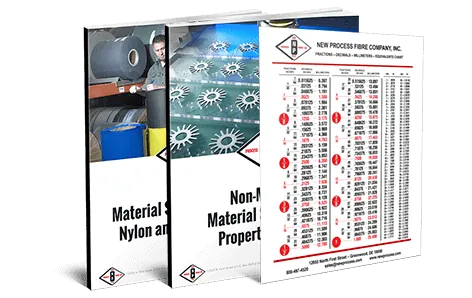Why Choose a Teflon Washer or Spacer?
When most people think of Teflon, nonstick frying pans come first to mind. But kitchenware is far from its only use. A polytetrafluoroethylene (PTFE)-based synthetic fluoropolymer of tetrafluoroethylene, Teflon is a high-molecular-weight compound consisting carbon and fluorine — and is one of the most commonly used artificial substances in the world. It’s found in nearly every industry, including aerospace, computer, heating and cooling, plumbing, appliance, furniture, power tools, and even music. And thanks to its many unique characteristics, it’s also become a popular material choice for washers and spacers.
Common Applications for Teflon Washers
Teflon or PTFE washers are flat discs with a centrally located hole. They have superior antifriction properties, as well as excellent chemical and corrosion resistance. These washers are ideal for low-temperature applications.
Washers can do way more than secure bolts, nuts, screws, and rivets. They can also insulate, seal, lock, serve as spacers, provide spring force, align parts, distribute loads, and even improve aesthetics. There are six primary types of washers: flat, shoulder, tab, lock, countersunk, and spring.
A large number of washers are of the flat variety. Flat washers are thin and flat, and have a centrally located hole. Their internal and external shapes can vary depending on the specific application; round, square, hexagonal, and rectangular flat washers are all available. They may also be nonsymmetrical.
Shoulder washers, also called step or flange washers, have an integral cylindrical sleeve designed to mate with a cutout and segregate the fastener from the material to which it’s attached. These washers are typically used as insulators in electronic equipment.
Tab washers, meanwhile, are round. They’re made with single or multiple tabs and notches, which can be molded to fit around bolts and nuts. Tab washers can also lay flat. These are often used in harsh environments to lock a part into place, such as in extremely hot regions or areas in which washers and other components will be subject to heavy vibrations.
Lock washers secure fasteners that typically rotate or lose friction. A split coil or the teeth of the washer grip the head of the fastener against another flat surface. Sometimes, they are used along with a flat washer to distribute load evenly without deforming the assembly to which the fastener is attached.
Countersunk, or finishing, washers also capture the head of the fastener, and provide a flush surface when in place. These often are found in consumer products, and are ideal for situations in which assemblies require a part to take up play, compensate for expansion or contraction in materials, maintain tension, absorb shock loads, or provide a controlled reaction under dynamic loads. There are three kinds of spring washers available: cylindrically curved, wave, and Belleville.
The Advantages and Disadvantages of Teflon Washers
Teflon or PTFE spacers and washers have an edge over nylon and plastic washers in a few different areas. Nylon washers, for example, are wear-resistant, have high mechanical strength, and possess good dielectric properties. But Teflon spacers and washers also allow for low friction, a near-total resistance to water and other liquids, and reliable chemical resistance. They also have a high melting point, at 620 °F. Teflon is an excellent insulator and is FDA-approved.
Despite its many strengths, however, Teflon does have its drawbacks. Because Teflon has very little elasticity, it tends to deform over time. And, at temperatures around 500 °F, it will begin outgassing materials that are harmful to humans. For these reasons, it’s not the best option for high-temperature environments. Also, it’s relatively expensive compared with other nonmetallic materials due to its many unique advantages and consistently high demand.
Learn More
Here at New Process Fibre, our state-of-the-art tooling capabilities allow us to manufacture top-quality flat specialty washers for the fastener industry. With more than 8,000 washer dies in stock, we can fabricate washers in quantities from one to 1 million. To explore which material is right for your specific application, contact our expert team today to receive a personalized quote.


